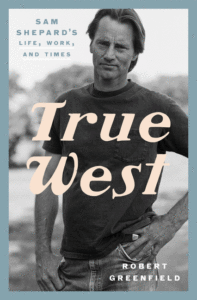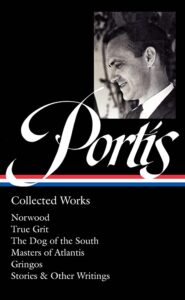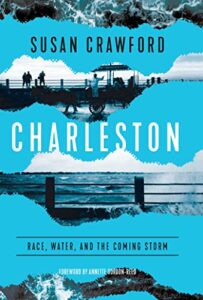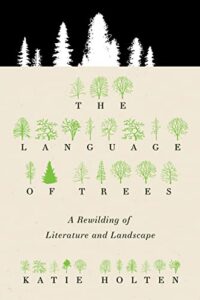
Article continues after advertisement
Our feast of fabulous reviews this week includes Ethan Hawke 0n Robert Greenfield’s True West: Sam Shepard’s Life, Work, and Times, Casey Cep on Charles Portis’s Collected Works, Emily Raboteau on Susan Crawford’s Charleston: Race, Water, and the Coming Storm, Frances Wilson on The Diaries of Franz Kafka, and Kristen Millares Young on Katie Holton’s The Language of Trees.
Brought to you by Book Marks, Lit Hub’s “Rotten Tomatoes for books.”
*

Article continues after advertisement
“I first met Sam Shepard in Chicago at a rehearsal for Steppenwolf’s production of his play Buried Child in 1995. At the morning coffee break, over bagels and orange juice, he asked if I liked Maker’s Mark. When I said I did, he suggested we blow off the rest of rehearsal and get drunk. He was serious. A few years later he played my father in a film of Hamlet. In rehearsal he spoke commandingly about Shakespeare’s percussive qualities—then lost his temper, ripping into a camera assistant who had botched the focus on his best take. Moments later he called the company together to publicly apologize to the man, blaming his outburst on his own mediocrity as an actor …
I lead with all this to state the obvious: Sam Shepard was a complicated man. Capturing his persona and making a clear narrative out of his mercurial life are not easy tasks. Shepard’s writing is intimate and passionate and feels full of secrets—truths whispered to like-minded souls. Those of us who have read most of his work, much of it seeming like thinly fictionalized memoir, feel like we know his inner story: his sense of alienation, his search for an authentic definition of masculinity and his drive for balance in the masculine/feminine dynamic. In his plays, Shepard’s song of the self is clearly scored …
It’s a curious experience to read a biography of someone you knew written by someone who did not know them. I opened this book eager to find out how a more objective observer would view and summarize such an elusive man’s life. I recognized the figure presented in the pages of True West and learned a great deal about what happened in his life before and after I met him. But the man remains essentially inscrutable, as if we are cross-examining him from the distance of a drone—we learn where and when he went, but we have no idea why. And that is probably the way Sam Shepard would have liked it.”
–Ethan Hawke 0n Robert Greenfield’s True West: Sam Shepard’s Life, Work, and Times (The Washington Post)

Article continues after advertisement
“It was a source of some annoyance to Charles Portis that Shakespeare never wrote about Arkansas … Portis’s other novels weren’t exactly Westerns—more like Southwesterns, Headed Easterns, and Getting Losterns—but they are all populated by equally memorable figures…It’s absurdly fun to follow his oddballs and their odysseys, but something more than fun, too. Portis’s genius went beyond character in the strictly literary sense, to reveal something about moral character and many somethings about the character of this country …
‘Anything I set out to do degenerates pretty quickly into farce,’ he once explained. That’s true, yet Portis was selling himself short. Although his novels have the fun of farce, part of what’s so charming about them is their relentless plausibility….Even the most outlandish of Portis plots are populated by the kind of Everymen found in almost every Zip Code in this country: barmaids, shopkeeps, shade-tree mechanics, high-and-dry hippies, would-be writers, secretaries, veterans, junkyard scrappers. They are themselves a kind of Library of Americans, and Portis is excellent not only on their day jobs but also on their daydreams and stray thoughts and endogenous knowledge of the world…
The descendants of circuit riders and frontier evangelists, they are trying to make sense of the moral universe they’ve inherited and the modern world they’re making as the gravitational pull of grander virtues weakens … Portis’s plots hark back to those moral pilgrimages of Geoffrey Chaucer and John Bunyan. But the stakes in his work are never quite salvation or damnation—there’s nowhere as high as Heaven or as low as Hell. Instead, his pilgrims traverse the eschatological latitudes in between, relying for guidance on the modern scriptures of advertising, legal writs, and road signs … In a Portis novel, when you ride off into the sunset you have to make camp in the dark.”
–Casey Cep on Charles Portis’s Collected Works (The New Yorker)

Article continues after advertisement
“All true climate-change stories are about the abuse of power. Knowing this, Susan Crawford makes a plea for climate justice in Charleston, her sweeping case study of the South Carolina city. Her premise is that this imperiled place is a bellwether for the rest of the coastal United States, where government at every level is failing to prepare for the catastrophic effects of sea level rise and increasingly severe storms, which are threatening lives and causing billions of dollars in damage. It’s a purposefully unsettling premise …
What is unique about Charleston, in Crawford’s view, is the misalliance between its reputation for charming hospitality and the burden of risk allotted to its poorest residents … Crawford’s book stands apart from its predecessors because of its sustained focus on one threatened city…Charleston is a fascinating and haunted locale, and Crawford is gifted at sketching its grossness and grace … Like a tour guide walking us back in time and across town, Crawford shows us the ways in which legacies of slavery and racism have shaped Charleston’s response to the present.”
–Emily Raboteau on Susan Crawford’s Charleston: Race, Water, and the Coming Storm (The New York Times Book Review)

“Kafka wrote bedtime stories in the sense that he wrote about the terrifying things that might happen in bed … As for the intimacies of married life, Kafka’s horror is summed up in his diaries by his mention of ‘the sight of the nightshirts on my parents’ beds.’ He also wrote his stories at bedtime. This is because he had difficulty sleeping—but he had difficulty sleeping, he realized, because he wrote, which made him susceptible to the kind of states ‘that would tear me open and could make me capable of anything’ …
Article continues after advertisement
These were the Promethean conditions he chose for himself because daily anguish, entrapment, and unresolvable obstacles were essential to the special nature of his work, whose central comedy, or tragedy, is that being bound to a rock is unbearable but being unbound is even worse. His writing therefore kept alive the hatreds of his father, his job, and his goldfish-bowl existence … In a 1998 speech called ‘Some Remarks on Kafka’s Funniness from Which Probably Not Enough Has Been Removed,’ David Foster Wallace said that he gave up teaching Kafka because his students didn’t get the central joke, ‘that the horrific struggle to establish a human self results in a self whose humanity is inseparable from that horrific struggle.’
But even if we do understand the joke, laughing at Kafka’s diaries has, until now, felt like a misreading because Brod projected his own seriousness onto his friend. Ross Benjamin’s carnivalesque translation licenses our laughter by confirming, as Kafka put it in The Trial, that ‘the right perception of any matter and a misunderstanding of the same matter do not wholly exclude each other.’”
–Frances Wilson on The Diaries of Franz Kafka (The New York Review of Books)

“Communicators. Migrants. Soothsayers. Beings more deserving of the rights of personhood than the corporations that have been conferred that legal protection. Editor and artist Katie Holten celebrates all the ways trees are infinitely more complex than commonly envisioned in her new anthology … As in many anthologies, there are moments when the narrative arc commonly expected of book-length works feels more like a winding trail through the woods. But the wet slap of ferns is a good reminder that not all paths should be cleared, and the moments of delight are many. More than informative, The Language of Trees is inspiring; many of its writers merge the lyric with insights that are scientific, intimate and surprising … Erudite, impassioned and intentional, The Language of Trees is a call to action for those who still care.”
Article continues after advertisement
–Kristen Millares Young on Katie Holton’s The Language of Trees (The Washington Post)


























